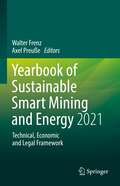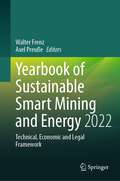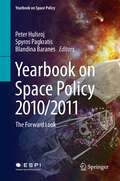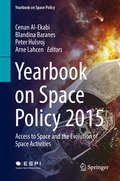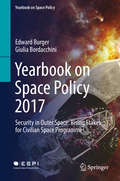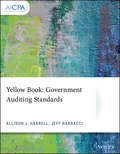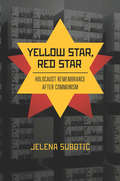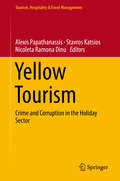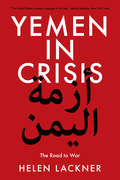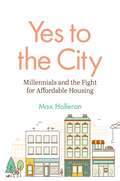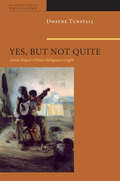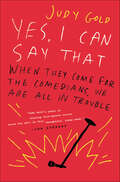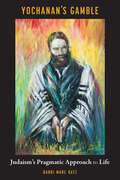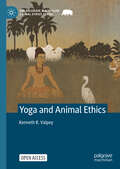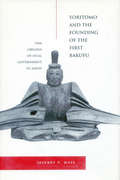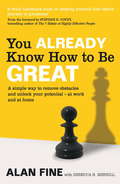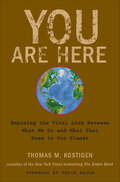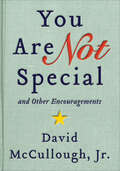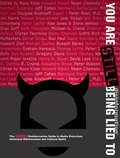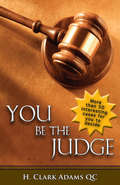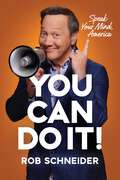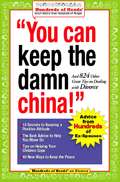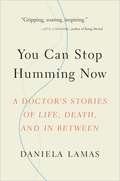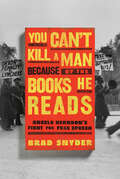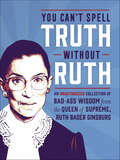- Table View
- List View
Yearbook of Sustainable Smart Mining and Energy 2021: Technical, Economic and Legal Framework (Yearbook of Sustainable Smart Mining and Energy - Technical, Economic and Legal Framework #1)
by Walter Frenz Axel PreußeThis book is at the center of the UN goals of combining environment and economic development with new technologies.First, sustainability in mining is defined as a process of transformation. This is followed by an outlook on the aspects of safety, economy, environmental impact and digital transformation. The book includes a discussion of new aspects such as the problem of liability for mining damages regarding climate change in Peru. Specific technical issues in smart mining are covered as well, such as underground localization systems based on ultra-wide band radio and inertial navigation, or the use of thermal imaging for roof crack detection. In addition, the characterization of material flows, subsurface hydrogen-storage systems and the prediction of mining induced subsidence and uplift are dealt with.The Sustainable Smart Mining and Energy Yearbook is not only aimed at researchers professionals, but at all who want to get an overview of the important technical and legal topics in this field.
Yearbook of Sustainable Smart Mining and Energy 2022: Technical, Economic and Legal Framework (Yearbook of Sustainable Smart Mining and Energy - Technical, Economic and Legal Framework #2)
by Walter Frenz Axel PreußeThis book covers several aspects of the application of Sustainable Development Goals to mining related subjects. The included works range from methods to assess and implement sustainability to discussions of legal impacts and relations as well as technological developments and outlooks. First, the challenges and opportunities of clean energy transition in the African mining sector are described. With regard to the assessment of sustainable developments, this book includes the applications of the sieving method, the concept of thermodynamics and the United Nations Framework Classification to mining projects and case studies. The implementation of Sustainable Development Goals into academic project work and education of geo-engineers is covered as well. The legal topics contain discussions of corporate climate liabilities and extraterritorial legal responsibilities as well as an analysis of the impact of the German Federal Constitutional Court's climate decision. Important mining aspects and technological developments like proactive water management, sustainable approaches to mine closure and implementation of ventilation on demand in underground mines are described. In addition, the state and potential of the Mongolian raw materials industry is covered. The Sustainable Smart Mining and Energy Yearbook is not only aimed at researchers and professionals, but at all who want to get an overview of current important technical and legal topics in this field.
Yearbook on Space Policy 2010/2011
by Peter Hulsroj Blandina Baranes Spyros PagkratisThe Yearbook on Space Policy is the reference publication analysing space policy developments. Each year it presents issues and trends in space policy and the space sector as a whole. Its scope is global and its perspective is European. The Yearbook also links space policy with other policy areas. It highlights specific events and issues, and provides useful insights, data and information on space activities. The Yearbook on Space Policy is edited by the European Space Policy Institute (ESPI) based in Vienna, Austria. It combines in-house research and contributions of members of the European Space Policy Research and Academic Network (ESPRAN), coordinated by ESPI. The Yearbook is designed for government decision-makers and agencies, industry professionals, as well as the service sectors, researchers and scientists and the interested public.
Yearbook on Space Policy 2015
by Peter Hulsroj Cenan Al-Ekabi Blandina Baranes Arne LahcenThe Yearbook on Space Policy, edited by the European Space Policy Institute (ESPI), is the reference publication analysing space policy developments. Each year it presents issues and trends in space policy and the space sector as a whole. Its scope is global and its perspective is European. The Yearbook also links space policy with other policy areas. It highlights specific events and issues, and provides useful insights, data and information on space activities. The first part of the Yearbook sets out a comprehensive overview of the economic, political, technological and institutional trends that have affected space activities. The second part of the Yearbook offers a more analytical perspective on the yearly ESPI theme and consists of external contributions written by professionals with diverse backgrounds and areas of expertise. The third part of the Yearbook carries forward the character of the Yearbook as an archive of space activities. The Yearbook is designed for government decision-makers and agencies, industry professionals, as well as the service sectors, researchers and scientists and the interested public.
Yearbook on Space Policy 2017: Security in Outer Space: Rising Stakes for Civilian Space Programmes (Yearbook on Space Policy)
by Edward Burger Giulia BordacchiniThe book describes the recent trends in space policy and the space sector overall. While maintaining a global scope with a European perspective, it links space policy with other policy areas, highlights major events, and provides insights on the latest data. The Yearbook includes the proceedings of ESPI's 12th Autumn Conference, which discussed the growing importance of Security in Outer Space and the stakes for civilian space programmes in the public and private sectors. Bringing together satellite operators, SMEs, European and American institutions, and think tanks, the Autumn Conference served as platform for fresh insights on security in outer space and the potential of transatlantic relations to address its challenges. The Yearbook also includes executive summaries of ESPI's work in 2017 as well as ESPI's 2017 Executive Briefs, covering topics such as suborbital spaceflight, super heavy lift launch vehicles, collaboration with China, and the delimitation of outer space. All in all, the book gives a detailed review of space policy developments worldwide, contextualised with information about national-level space industries and activity and broader political and economic conditions. The readership is expected to include the staff of space agencies, the space industry, and the space law and policy research community.
Yellow Book: Government Auditing Standards
by Allison J. Harrell Jeff BarbacciYellow Book: Government Auditing Standards by Allison J. Harrell, Jeff Barbacci
Yellow Star, Red Star: Holocaust Remembrance after Communism
by Jelena SubotićYellow Star, Red Star asks why Holocaust memory continues to be so deeply troubled—ignored, appropriated, and obfuscated—throughout Eastern Europe, even though it was in those lands that most of the extermination campaign occurred. As part of accession to the European Union, Jelena Subotić shows, East European states were required to adopt, participate in, and contribute to the established Western narrative of the Holocaust. This requirement created anxiety and resentment in post-communist states: Holocaust memory replaced communist terror as the dominant narrative in Eastern Europe, focusing instead on predominantly Jewish suffering in World War II. Influencing the European Union's own memory politics and legislation in the process, post-communist states have attempted to reconcile these two memories by pursuing new strategies of Holocaust remembrance. The memory, symbols, and imagery of the Holocaust have been appropriated to represent crimes of communism.Yellow Star, Red Star presents in-depth accounts of Holocaust remembrance practices in Serbia, Croatia, and Lithuania, and extends the discussion to other East European states. The book demonstrates how countries of the region used Holocaust remembrance as a political strategy to resolve their contemporary "ontological insecurities"—insecurities about their identities, about their international status, and about their relationships with other international actors. As Subotić concludes, Holocaust memory in Eastern Europe has never been about the Holocaust or about the desire to remember the past, whether during communism or in its aftermath. Rather, it has been about managing national identities in a precarious and uncertain world.
Yellow Tourism: Crime And Corruption In The Holiday Sector (Tourism, Hospitality & Event Management)
by Alexis Papathanassis Stavros Katsios Nicoleta Ramona DinuThis book presents the latest research and novel case studies on crime and corruption in the tourism and hospitality industry. It approaches tourism as both a globalised business impacting the livelihood of millions of people, and a highly challenging field of action for national legislators and law enforcement agencies. The global nature and ubiquity of tourism, as well as the core elements of the holiday experience - such as interactions with unknown environments and places, a care-free mind-set, novelty-seeking behaviour and anonymity - render it highly susceptible to victimisation, crime and corruption. Accordingly, the book addresses a comprehensive set of emerging issues, including: conflict and fraud during holidays; criminal and negligence offences at tourists’ expense; exploitation and mistreatment of service workers; deterioration of heritage, cultural and natural resources; and securitisation of tourism.
Yemen in Crisis: Road to War
by Helen LacknerExpert analysis of Yemen's social and political crisis, with profound implications for the fate of the Arab World The democratic promise of the 2011 Arab Spring has unraveled in Yemen, triggering a disastrous crisis of civil war, famine, militarization, and governmental collapse with serious implications for the future of the region. Yet as expert political researcher Helen Lackner argues, the catastrophe does not have to continue, and we can hope for and help build a different future in Yemen.Fueled by Arab and Western intervention, the civil war has quickly escalated, resulting in thousands killed and millions close to starvation. Suffering from a collapsed economy, the people of Yemen face a desperate choice between the Huthi rebels on the one side and the internationally recognized government propped up by the Saudi-led coalition and Western arms on the other. In this invaluable analysis, Helen Lackner uncovers the roots of the social and political conflicts that threaten the very survival of the state and its people. Importantly, she argues that we must understand the roots of the current crisis so that we can hope for a different future for Yemen and the Middle East.With a preface exploring the US’s central role in the crisis.
Yes to the City: Millennials and the Fight for Affordable Housing
by Max HolleranA fascinating account of the growing "Yes in My Backyard" urban movement The exorbitant costs of urban housing and the widening gap in income inequality are fueling a combative new movement in cities around the world. A growing number of influential activists aren&’t waiting for new public housing to be built. Instead, they&’re calling for more construction and denser cities in order to increase affordability. Yes to the City offers an in-depth look at the &“Yes in My Backyard&” (YIMBY) movement. From its origins in San Francisco to its current cadre of activists pushing for new apartment towers in places like Boulder, Austin, and London, Max Holleran explores how urban density, once maligned for its association with overpopulated slums, has become a rallying cry for millennial activists locked out of housing markets and unable to pay high rents.Holleran provides a detailed account of YIMBY activists campaigning for construction, new zoning rules, better public transit, and even candidates for local and state office. YIMBY groups draw together an unlikely coalition, from developers and real estate agents to environmentalists, and Holleran looks at the increasingly contentious battles between market-driven pragmatists and rent-control idealists. Arguing that advocates for more housing must carefully weigh their demands for supply with the continuing damage of gentrification, he shows that these individuals see high-density urbanism and walkable urban spaces as progressive statements about the kind of society they would like to create.Chronicling a major shift in housing activism during the past twenty years, Yes to the City considers how one movement has reframed conversations about urban growth.
Yes, But Not Quite: Encountering Josiah Royce's Ethico-Religious Insight (American Philosophy)
by Dwayne A. TunstallThis book contends that Josiah Royce bequeathed to philosophy a novel idealism based on an ethico-religious insight. This insight became the basis for an idealistic personalism, wherein the Real is the personal and a metaphysics of community is the most appropriate approach to metaphysics for personal beings, especially in an often impersonal and technological intellectual climate. The first part of the book traces how Royce constructed his idealistic personalism in response to criticisms made by George Holmes Howison. That personalism is interpreted as an ethical and panentheistic one, somewhat akin to Charles Hartshorne's process philosophy. The second part investigates Royce's idealistic metaphysics in general and his ethico-religious insight in particular. In the course of these investigations, the author examines how Royce's ethico-religious insight could be strengthened by incorporating the philosophical theology of Dr. Reverend Martin Luther King, Jr., and Emmanuel Levinas's ethical metaphysics. The author concludes by briefly exploring the possibility that Royce's progressive racial anti-essentialism is, in fact, a form of cultural, antiblack racism and asks whether his cultural, antiblack racism taints his ethico-religious insight.
Yes, I Can Say That: When They Come for the Comedians, We Are All in Trouble
by Judy Gold"No one makes me laugh harder than Judy Gold. If I had to pick one comedian to write a book about free speech, it would be Judy." – Amy SchumerFrom award-winning comedian Judy Gold, a concise, funny, and thoughtful polemic on the current assault on comedy, that explores how it is undermining free speech and a fundamental attack against the integrity of the art.From Mae West and Lenny Bruce to Richard Pryor and Howard Stern to Kathy Griffith and Kevin Hart, comedians have long been under fire for using provocative, often taboo subjects to challenge mores and get a laugh. But in the age of social media, comedians are at greater risk of being silenced, enduring shaming, threats, and damaged careers because of angry, censorious electronic mobs. But while comedians’ work has often been used to rile up detractors, a new threat has emerged from the left: identity politics and notions like "safetyism" and trigger warnings that are now creating a cultural and political standard that runs perilously close to censorship. From college campuses to the Oscars, comics are being censured for old jokes, long-standing comedy traditions, unfinished bits and old material that instead of being forgotten, go viral. For comics like Judy Gold, today’s attacks on comics would have Richard Pryor and Lenny Bruce "rolling in their graves." "No one has the right to tell comics what they can or cannot joke about. Do you tell artists what they can or cannot paint?" she asks. Freedom of speech is fundamental for great stand-up comedy. Humor is the most palatable way to discuss a subversive or taboo topic, but it better be funny. A comic's observations are deliberately delivered to entertain, provoke, and lead to an exchange of ideas. "We are truth tellers." More important, the tolerance of free speech is essential for a healthy democracy.In addition to offering readers a quick study on the history of comedy and the arts (noting such historical reference points as The Hays Code) and the threats to them, Gold takes readers on a hilarious ride with chapters such as "Thank God Don Rickles is Dead," as well as her singular take on "micro-aggressions," such as:Person: "OMG! You’re a lesbian? I had no idea. I mean you wear make-up. When did you become a lesbian?"Judy Gold: "Coincidently, right after I met you!" (micro-assault!)In this era of "fake news," partisan politics, and heated rhetoric, the need to protect free speech has never been greater, especially for comics, who often serve as the canaries in the coalmine, monitoring the health of our democracy. Yes I Can Say That is a funny and provocative look at how safe spaces are the very antithesis of comedy as an art form—and an urgent call to arms to protect our most fundamental Constitutional right. There's a good reason it was the FIRST amendment.
Yochanan's Gamble: Judaism's Pragmatic Approach to Life
by Rabbi Marc KatzSome two thousand years ago, as the story goes, a rabbi named Yochanan makes the epitome of pragmatic gambles—wagering the entire fate of the Jewish people. In dialogue with the soon-to-be Roman emperor Vespasian, Yochanan tacitly acknowledges the Romans&’ planned destruction of Jerusalem in return for a plot of land in a town called Yavneh. There, after the razing of Jerusalem, Jews will join with their teacher to reenvision a new Judaism—one not based on Temple rites but on real life in exile—laying the groundwork for today&’s vibrant Judaism. In Rabbi Marc Katz&’s novel examination, pragmatism is itself an authentic Jewish strategy for addressing moral questions. The rabbis of the Talmud model the process by demonstrating how to think situationally, weigh competing values, and make hard compromises. Leading rabbis ask, &“What will work?&” alongside &“What is right?&” They birth a malleable and nuanced system of law (halakhah) that is faithful to their received tradition and to the people and circumstances before them. By investigating how the rabbis navigate their own ethical challenges—determining truth, upholding compromise, convincing others, keeping peace with neighbors, avoiding infighting, weighing sinning in hopes of promoting a greater good—Yochanan&’s Gamble forges a new Jewish path forward for resolving moral conundrums in our day.
Yoga and Animal Ethics (The Palgrave Macmillan Animal Ethics Series)
by Kenneth R. ValpeyThis open access book offers a comprehensive understanding of yoga theory and practice as it bears on several dimensions of animal-related ethical reflection and action. "Yoga" has become a household word in recent decades and, increasingly, has drawn physical yoga practitioners to explore its philosophy; significantly, classical yoga philosophy and praxis are deeply grounded in realizing the self in relation with all beings as non-material selves. Therefore yoga provides an ideal entry-way into contemporary animal ethics discourse, contributing particularly in its appeal to the experiential dimension of human self-understanding in relation to nonhuman animals.
Yoritomo and the Founding of the First Bakufu
by Jeffrey P. MassThis book is a much expanded and wholly rewritten treatment of the subject of the author's first book, "Warrior Government in Early Medieval Japan," published in 1974. In this new version, the "warrior" and "medieval" character of Japan's first shogunate is significantly de-emphasized, thus requiring not only a new title, but also a new book. The author's new view of the final decades of twelfth-century Japan is one of a less revolutionary set of experiences and a smaller achievement overall than previously thought. The pivotal figure, Minamoto Yoritomo, retains his dominant role in establishing the "dual polity" of Court and Bakufu, but his successes are now explained in terms of more limited objectives. A new regime was fit into an environment that was still basically healthy and vibrant, leading not to the substitution of one government for another, but rather to the emergence of a new authority that would have to interact with the old. The book aims to present a dual perspective on the period by juxtaposing what we know against our best possible estimate of what Yoritomo himself knew. It is deeply concerned with the multiple balancing acts introduced by this ever nimble experimenter in governing, who was forever seeking to determine, and then to promote, what would work while curtailing or eliminating what would not. The author seeks to recreate step-by-step the movement from one historical juncture to another, whether this means adapting already available information, building anew, or working with combinations of materials. Throughout, the book addresses new topics and offers many new interpretations on subjects as wide-ranging as the 1189 military campaign in the north and the phenomenon of delegated authority.
You Already Know How To Be Great: A simple way to remove interference and unlock your potential - at work and at home
by Alan Fine Rebecca R. MerrillAccording to Alan Fine, every one of us has the capacity for greatness. So what is it that's stopping us from reaching our true potential? The answer: too much information.Most people who want to get better at hitting golf shots, negotiating with clients, delivering presentations, or any field of endeavour - seek out new information. They read a book, take a class, employ an expert tutor. But as Alan Fine has learned from many years of coaching athletes and businesspeople, this 'outside-in' approach often doesn't produce the results people want. More information becomes a distraction rather than a solution, and high performance remains elusive. Fortunately, there is a better way. Fine has developed and honed a unique 'inside-out' approach to performance improvement which is not about gaining new knowledge, but instead about using the knowledge you already have. Through a simple four-step process, Fine shows how to remove the obstacles that get in the way of applying your existing skills to unlock your natural potential. No matter who you are or what you do, this book will help you get better.
You Are Here: Exposing the Vital Link Between What We Do and What That Does to Our Planet
by Thomas M. KostigenIn this groundbreaking book, the New York Times bestselling coauthor of The Green Book Thomas M. Kostigen reveals the vital missing link in today's environmental crisis: how we as individuals are connected to the most tenuous geography on the planet. Despite the recent prominence of "green" issues in the news, the direct relationship between our actions and the earth is too often ignored. But the seemingly insignificant things we do every day have the power to literally alter the landscape in the ongoing battle to resuscitate the planet.
You Are Not Special: And Other Encouragements
by David McCullough Jr.A profound expansion of David McCullough, Jr.'s popular commencement speech—a call to arms against a prevailing, narrow, conception of success viewed by millions on YouTube—You Are (Not) Special is a love letter to students and parents as well as a guide to a truly fulfilling, happy life.Children today, says David McCullough—high school English teacher, father of four, and son and namesake of the famous historian—are being encouraged to sacrifice passionate engagement with life for specious notions of success. The intense pressure to excel discourages kids from taking chances, failing, and learning empathy and self-confidence from those failures.In You Are (Not) Special, McCullough elaborates on his now-famous speech exploring how, for what purpose, and for whose sake, we're raising our kids. With wry, affectionate humor, McCullough takes on hovering parents, ineffectual schools, professional college prep, electronic distractions, club sports, and generally the manifestations, and the applications and consequences of privilege. By acknowledging that the world is indifferent to them, McCullough takes pressure off of students to be extraordinary achievers and instead exhorts them to roll up their sleeves and do something useful with their advantages.
You Are Still Being Lied To: The New Disinformation Guide to Media Distortion, Historical Whitewashes and Cultural Myths (Disinformation Books)
by Russ KickA must-have revised and expanded edition of The Disinformation Companys classic anthology, You Are STILL Being Lied To contains more than a dozen all-new essays from contributors like Norman Solomon, Graham Hancock, Alex Jones, John Major Jenkins, Robert Bauval, Richard DeGrandpre, Alexandra Bruce,John Hogue, Gregory Davis, and Scott Creighton on topics ranging from the misleading marketing of antidepressants to the truth about the North American Union, from media consolidation to the New Thought movement.Editor Russ Kicks massive collection acts as a battering ram against the distortions, myths, and outright lies that have been shoved down our throats by the government, the media, corporations, organized religion, the scientific establishment, and others who want to keep the truth from us.An unprecedented group of researchers including Howard Zinn, Noam Chomsky, Howard Bloom, Sydney Schanberg, Michael Parenti, Riane Eisler, Jim Marrs, and many, many others paint a picture of a world where crucial stories are ignored or actively suppressed and the official version of events has more holes in it than Swiss cheese. A world where real dangers are downplayed and nonexistent dangers are trumpeted. In short, a world where you are being lied to.
You Be the Judge
by H. Clark AdamsH. Clark Adams let you be the judge on 60 cases that he’s already made his decisions on in the legal arena of small claims court. It’s enough to put you off wedded bliss forever, but if you did harbour strong opinions on how the case Smith v Brown a couple on the brink of matrimony, interfering relatives notwithstanding should unfold, H. Clark Adams welcomes you to the legal arena of small claims court. Here feuding former lovers, despondent homeowners, and singed shopkeepers bring their grievances against their erstwhile partners in love and business for a ruling that could end the troubled relationship and maybe even offer them material or monetary comfort. In a tone that’s distinctly light-hearted, the retired deputy judge offers readers a fictionalized sampling of the cases presented at small claims court, and the chance for them to pit their best instincts and powers of judgment against his. Part I of the book is a collection of cases from the gripping to the ridiculous, whilePart II features Adams’s decisions on the cases presented. If your view on these 60 cases differs from the learned judge, be warned: no appeal to his decision has ever been successful.
You Can Do It!: Speak Your Mind, America
by Rob SchneiderAn unfiltered and outrageously funny commentary on the threats to free speech in America from the legendary comedian, actor, and Emmy-nominated SNL writer. Rob Schneider&’s childhood in the San Francisco Bay area with parents of mixed-race backgrounds shaped his view of the world: that America affords the greatest opportunity for peoples from all nations and all faiths. But today, in this world gone mad, free speech is under attack. And Schneider keeps finding himself in controversy for questioning what woke ideology is doing to our great nation. Still, he refuses to be censored. In his debut book, Schneider will make you laugh out loud as he tells his unique story of a Hollywood-comedian-turned-vocal-advocate for open dialogue. He takes readers along for a ride through his life in show business (where he&’s starred in 27 movies with his friend Adam Sandler), shares stories from the glory days of Saturday Night Live, and makes a persuasive case for fearlessness in speech and pushing the boundaries in comedy. Comedians matter because they have a unique position in society to stand up against tyranny. In this book, Schneider shares never-before-told personal stories about Chris Farley, Norm Macdonald, Christopher Walken, Dana Carvey, and Martin Landau, and other comedy legends. You Can Do It! is part celeb memoir, part warning, and part siren call to action. It was said during the days of Covid the difference between a conspiracy theory and the truth was about six months. Influenced by his own experiences in Hollywood, Schneider illustrates his points about free expression with provocative commentary on things you aren't suppose to question, like identity politics, Covid tyranny, "global boiling," medical freedoms and more. Schneider refuses to believe he&’s dangerous for saying what he thinks. In fact, the opposite is true—it&’s dangerous to not question the narrative. It&’s dangerous to not exercise your free speech. That&’s what Rob Schneider&’s doing. And as this humorous, shocking, irreverent but insightful book shows readers, you can do it too.
You Can Keep the Damn China!
by Robert J. Nachsin Jennifer Bright ReichAlmost 50% of American marriages end in divorce, so it stands to reason that most people have experienced the effects of divorce in some way. Breaking up is hard to do, but that rocky road can be smoothed with this guide featuring contributions by hundreds of former spouses who've made it out in one piece. Eye-opening stories and advice cover getting through the initial tough times; how to break the news to your children and help them cope; dealing with bitter in-laws and other family members; legal wrangling and dividing your stuff; maintaining a relationship with your ex (is it possible?); and more.
You Can Stop Humming Now: A Doctor's Stories of Life, Death, and in Between
by Daniela LamasA critical care doctor's breathtaking stories about what it means to be saved by modern medicineModern medicine is a world that glimmers with new technology and cutting-edge research. To the public eye, medical stories often begin with sirens and flashing lights and culminate in survival or death. But these are only the most visible narratives. As a critical care doctor treating people at their sickest, Daniela Lamas is fascinated by a different story: what comes after for those whose lives are extended by days, months, or years as a result of our treatments and technologies?In You Can Stop Humming Now, Lamas explores the complex answers to this question through intimate accounts of patients and their families. A grandfather whose failing heart has been replaced by a battery-operated pump; a salesman who found himself a kidney donor on social media; a college student who survived a near fatal overdose and returned home, alive but not the same; and a young woman navigating an adulthood she never thought she'd live to see -- these moving narratives paint a detailed picture of the fragile border between sickness and health.Riveting, gorgeously told, and deeply personal, You Can Stop Humming Now is a compassionate, uncompromising look at the choices and realities that many of us, and our families, may one day face.
You Can't Kill a Man Because of the Books He Reads: Angelo Herndon's Fight for Free Speech
by Brad SnyderThe story of a young, Black Communist Party organizer wrongly convicted of attempting to incite insurrection and the landmark case that made him a civil rights hero. Decades before the impeachment of an American president for a similar offense, Angelo Herndon was charged under Georgia law with “attempting to incite insurrection”—a crime punishable by death. In 1932, the eighteen-year-old Black Communist Party organizer was arrested and had his room illegally searched and his radical literature seized. Charged under an old slave insurrection statute, Herndon was convicted by an all-white jury and sentenced to eighteen to twenty years on a chain gang. You Can’t Kill a Man Because of the Books He Reads chronicles Herndon’s five-year quest for freedom during a time when Blacks, white liberals, and the radical left joined forces to define the nation’s commitment to civil rights and civil liberties. Herndon’s champions included the young, Black Harvard Law School–educated attorney Benjamin J. Davis Jr.; the future historian C. Vann Woodward, who joined the interracial Herndon defense committee; the white-shoe New York lawyer Whitney North Seymour, who argued Herndon’s appeals; and literary friends Ralph Ellison, Langston Hughes, and Richard Wright. With their support, Herndon won his freedom and reinvented himself as a Harlem literary star until a dramatic fall from grace. A legal odyssey of Herndon’s narrow escape from certain death because of his unpopular political beliefs, You Can’t Kill a Man Because of the Books He Reads explores Herndon’s journey from Alabama coal miner to Communist Party organizer to Harlem hero and beyond. Brad Snyder tells the stories of the diverse coalition of people who rallied to his cause and who twice appealed his case to the U.S. Supreme Court. They forced the Court to recognize free speech and peaceable assembly as essential rights in a democracy—a landmark decision in 1930s America as well as today.
You Can't Spell Truth Without Ruth: An Unauthorized Collection of Wise-Ass Wisdom from the Queen of Supreme, Ruth Bader Ginsburg
by Mary ZaiaSpeaking the Ruth to AmericaRuth Bader Ginsburg became a Supreme Court Justice in 1993, but her popularity has exploded over the last couple of years as she has been adopted as a modern feminist icon. An octogenarian who has proven that disagreeing does not make one disagreeable, Ginsburg is well-known for her pithy observations as well as her strongly argued dissents. Beloved by many – including her ideological opposition, former Supreme Court Justice Antonin Scalia, who was her dear friend – Ginsburg’s wisdom has never been more relevant or more important to American democracy.Sample quotes:“Women belong in all places where decisions are being made…it shouldn’t be that women are the exception.”“Fight for the things you care about, but do it in a way that will lead others to join you.”“People ask me sometimes…When will there be enough women on the Court? And I say, ‘When there are nine.’ People are shocked. But there’d been nine men, and nobody’s ever raised a question about that.”“My mother told me two things constantly. One was to be a lady and the other was to be independent. For most girls growing up in the ‘40s, the most important degree was not your B.A. but your M.R.S.”“We have the oldest written constitution still in force in the world, and it starts out with three words, ‘We, the people.’”
